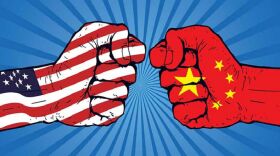Considering the trade war, protests in Hong Kong, and more, the relationship between the U.S. and China is filled with uncertainty. But a guest speaker at the Inland World Affairs Council last month says all that tension is the product of two unpredictable heads of government in the Trump Administration and Xi Jinping’s Communist Party.
Dr. Julia Strauss is a professor of Chinese politics at the School of Oriental and African Studies in London.
She visited Cal State San Bernardino on November 18 as part of the World Affairs Council of Inland Southern California’s China Town Hall.
Strauss says the defining issue in U.S.-China relations over the last few years hasn’t been the trade war, or Hong Kong – it’s been the Trump Administration.
Strauss: “One really never knows what is going to be happening with the Trump Administration from one day to the next, from one week to the next, from one month to the next. And the problem with any kind of regular diplomacy is that it relies on things being set up days, weeks, and sometimes months in advance. And that's nothing unusual, that's just how things work out, two sides have to sit down, they have to hash out agendas, they need to come up with talking points, they need to prepare everything very significantly in advance. Months in advance, in my understanding. And then the agendas get, you know, more compressed and there's more craziness as you get closer and closer and closer to the time of meetings, particularly if they're high-profile meetings. And so if it's a high-profile meeting, these things really need to be set up long long in advance, and the defining attribute of Trump as a president and the Trump administration as a presidency is that everything is done seemingly almost on impulse. Whatever it is that the president, comes to the president's attention that he then decides need to be done, that is then tweeted, everyone else is running around scrambling, trying to either make it happen or trying to make whatever the tweet of the day is, fit within a more medium-term and maybe one or two-year framing. And that, it seems, is very difficult for regular diplomacy and not just diplomacy, the regular ways in which governments work to handle. So I would say that the first and defining problem or issue of U.S.-China relations, just more generally, is that the Trump presidency itself is very erratic in what it seems to want and what it seems to want to do day-by-day, week-by-week, and sometimes it's even hour-by-hour.”
The other defining issue in U.S.-China relations, according to Strauss, is the administration of Xi Jinping as the president of the Chinese Communist Party.
Strauss: “The Chinese government is moving in a more centralized and more authoritarian direction, and yet nobody knows really what the endgame is. What it means, how people are and aren't working around it, how popular and not popular this is, because all of the data that we have, whether it's from Chinese official press or Western reporters who are trying to find out a range of different stories, how representative or not representative these stories really are. And so there's a kind of black box operating in a certain way, for all of the media scrutiny. There's kind of a black box going on at the heart of this administration, you just don't know what's going to come next. You really don't know despite all the scrutiny. And in a very open society with a lot of leaking and different way, we really don't know what the overall pattern and trajectory and result - or I won't say result, equilibrium is within China itself. Because we can chart it moving in a certain kind of direction,but China is so big and so diverse and yet presents such a unified official face to the outside, that it's very very hard to predict.”
You can learn more about the World Affairs Council of Inland Southern California at wacinlandsocal.org.


